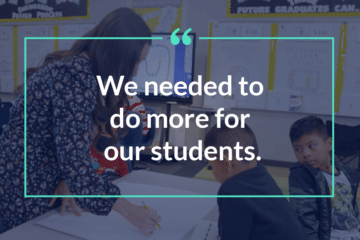
NCEE had the opportunity to speak with Scott Cheney, CEO of Credential Engine, a non-profit organization that is building an online credential registry to compile and describe the nearly one million credentials currently available in the U.S. You can learn more about Credential Engine’s work here.
NCEE: What is Credential Engine and why was it created?
Credential Engine was formed about four years ago to help make sense of a very confusing and inefficient education and training marketplace. We talk about the importance of everyone having education and skills, but it gets harder every day to navigate the options—starting with high school diplomas and extending to the wide variety of degrees, certificates, badges, licenses, certifications, apprenticeships, etc.—to know what they each offer and which ones have value. Part of the problem is we don’t have an easy way to search and compare the various credentials out there. Each institution uses its own language, and there is no central repository that individuals, businesses, and government agencies can use.
We don’t have an easy way to search and compare the various credentials out there.
So right now, if you’re a student or an out-of-work individual, and you want to study information technology (IT) for example, there is no way for you to compare a boot camp, an IT apprenticeship, a certificate offered by a community college, a two-year degree, an online program, a Google certificate, or a four-year degree. There’s no platform to use to find out about the full range of offerings, compare them to each other, figure out which provide the needed job skills, and how you might combine offerings to get the skills you need. What we’re trying to do is help bring all of that information into one place.
To do that, Credential Engine created a common description language so that institutions use the same terms when sharing the information about the cost, competencies, assessment, relation to other credentials, and outcomes of students who complete their programs. The data are housed in an open-source registry that is publicly available and can update in real time. Right now we are partnering with about half of the states as well as business partners and training providers to collect and publish data about the vast array of credentials available.
NCEE: Why is this needed and who will it help?
Having all of this information in an open and comparable common repository will allow students and adult learners to shop and compare education and training offerings more easily and make informed decisions related to their career goals. Employers will be able to use the information to better understand exactly which skills and competencies a potential employee has based on their credentials and which providers offer the strongest programs. State policymakers will be able to see if education and training providers’ offerings align with employer demand, if they are of high quality, if access is equitably distributed, and where there are gaps; they can also learn about programs offered in other states. Providers can collaborate to replicate strong models and design pathways of learning. Finally, counselors and CTE leaders in K-12 districts and schools can help students plan for and better understand further learning options post-high school.
Our whole mission is to get detailed credential information out of an Excel sheet, a Word doc, or a PDF, and have it live in a web-based, open schema that is similar to what you get on Expedia when you do a travel search. Through Expedia, you can look at Marriott versus Hyatt versus Hilton in Phoenix, and the reason you can compare all of those is that they’ve opted to publish the information about what they offer into a common language that underlies the entire travel industry.
We’re doing the same thing, publishing credential information using our common language and making it available through an open public registry that these various parties can access and use.
NCEE: How can this work be helpful at the K-12 level?
We think it is very important for young people—people of all ages really—to have clear education and training pathways. We know that many high school graduates struggle to transition to the next phase of learning or employment. We talk generally about college and career readiness, but making good decisions about the best education and training pathway is not always obvious to a student or even his or her parents or counselor. Nor do we do enough to help young people see how credentials can be combined and sequenced to provide the best set of skills for their goals. Yet that’s what we need if we expect everyone to engage in lifelong learning. With the right data that is updated as credential offerings and job needs change, our schools could do a much better job helping students to find the right next step.
Making good decisions about the best education and training pathway is not always obvious to a student or even his or her parents or counselor.
One area we see growing interest in is digital learning and employment records which could really help the next generation of workers. Digital records would document learning wherever it occurs, including at the workplace or through an education experience, credentialing, or military training. They can also include information about employment history and earnings. The benefit of a digital, portable, student-owned record is that it can provide detailed and verified information about job qualifications, regardless of where or how they acquired them. Like our credential registry, these records would be built using our common descriptor language which would make them easy to sync, update and access.
NCEE: How do you see fairness and access fitting into your agenda?
We’re all starting to better understand the barriers that are built into our education systems. With the digital learning and employment record I just mentioned, one of the key features is that it’s student-owned. And that’s important because right now we make graduates pay $50 to get a transcript verifying their credentials from particular institutions every time they want to enroll in a new program or apply for a job. That’s crazy. They should have the ability to access that information at any time and in a format that allows them to share it and signal its value. There’s a real argument to be made that a student should own his/her own record of accomplishment.
Another issue is employers’ reliance on four-year degrees as a prerequisite for jobs, not always because employers have confidence that the degree-holders bring a certain set of skills or competencies but because the degree serves as a proxy for general job readiness. But, that means a whole segment of the population is automatically disqualified from a job even if they have the required skill set. One reason is that we don’t know how to articulate the value of newer sub-degree offerings as well as we do the traditional four-year degree.
So, by bringing greater transparency to the world of certificates and badges and bootcamp certifications, we can challenge the mythology of the degree as the primary and best way to access a desirable job. Degrees are expensive and difficult to access for many populations, and there are other ways to attain and signal competency. We need to do a better job articulating the skills and competencies embedded in these more flexible sub-degree credentials. Until we do, a significant portion of the population will remain marginalized, harming both job seekers and employers.
By bringing greater transparency to the world of certificates and badges and bootcamp certifications, we can challenge the mythology of the degree as the primary and best way to access a desirable job.
NCEE: What’s next for Credential Engine?
We are very focused on continuing to build out what we see as a public good, our Credential Registry. This is being done through our partnership with states and other organizations in the U.S. We think we’ll have 30-35 states actively working with us by the middle of next year. Some states, like Connecticut, Florida, Texas, and Alabama, are requiring institutions in their states to list credentials in a common registry which is very effective in moving the work along faster. There’s also the opportunity to look outside of the United States. We are talking to folks in Australia, New Zealand, and Canada since our common description language is based on global standards and right now we are the only open-source registry of credentials. We can house credentials from all over the world.
We are also thinking about how we can make sure that each individual has the opportunity to use this data to design a personalized path based on their existing skill set and their desired career goals. By taking advantage of today’s technology and AI tools, there is potential to shift the whole education and training marketplace to be more competency-focused and skill-based. This can open up doors for populations that traditionally have had less access or who have been directed to lower value credentials.
And with the pandemic, this work only becomes more urgent as we try to ensure that those who lost jobs or chose to make a job shift during uncertain times can find an effective and efficient pathway back to work.




